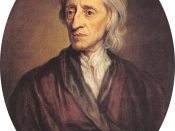Also known as 'The Age of Reason', the Enlightenment is a term used to describe a period emerging from centuries of darkness and ignorance into a new age enlightened by reason, science, and a respect for humanity. Although the Enlightenment is usually associated with the eighteenth century, it's roots go back much further and it is important to understand how the values of the enlightenment were shaped. Works such as Essay Concerning Human Understanding (1690) by John Locke, a hugely influential philosopher of the time and the founder of the school of 'Empiricism' emphasized the importance of the pursuit of knowledge rather than intuitive speculation. As this was a period following a time of voyage and discovery, those with an open mind were looking at foreign cultures and beginning to mistrust the foundations of thought on which conservative Britain stood. From atheists in Africa to communities which were profoundly Christian but nevertheless ate their own offspring.
Locke wrote, "How a rational man, that should enquire and know for himself, can consent himself with a Faith or Religion taken upon trustâ¦.is to me astonishing."#With the ever-growing distrust in religion, philosophers and economists were influenced and as new scientific discoveries were being made, emerged a new rational and logical way of thinking. Isaac Newton's discovery of universal gravity propelled this even further. The thought was, if humanity could unlock the laws of the universe then it could also unlock the laws of all nature and society, and so an era dominated by dogma and fanaticism was in the reaches of an end.
Alongside the religious aspects of thought, were social and economic ideologies emanating from other European countries such as France and Holland. As trade and communication had improved in the Renaissance period, the general public were gaining political and economic consciousness.


